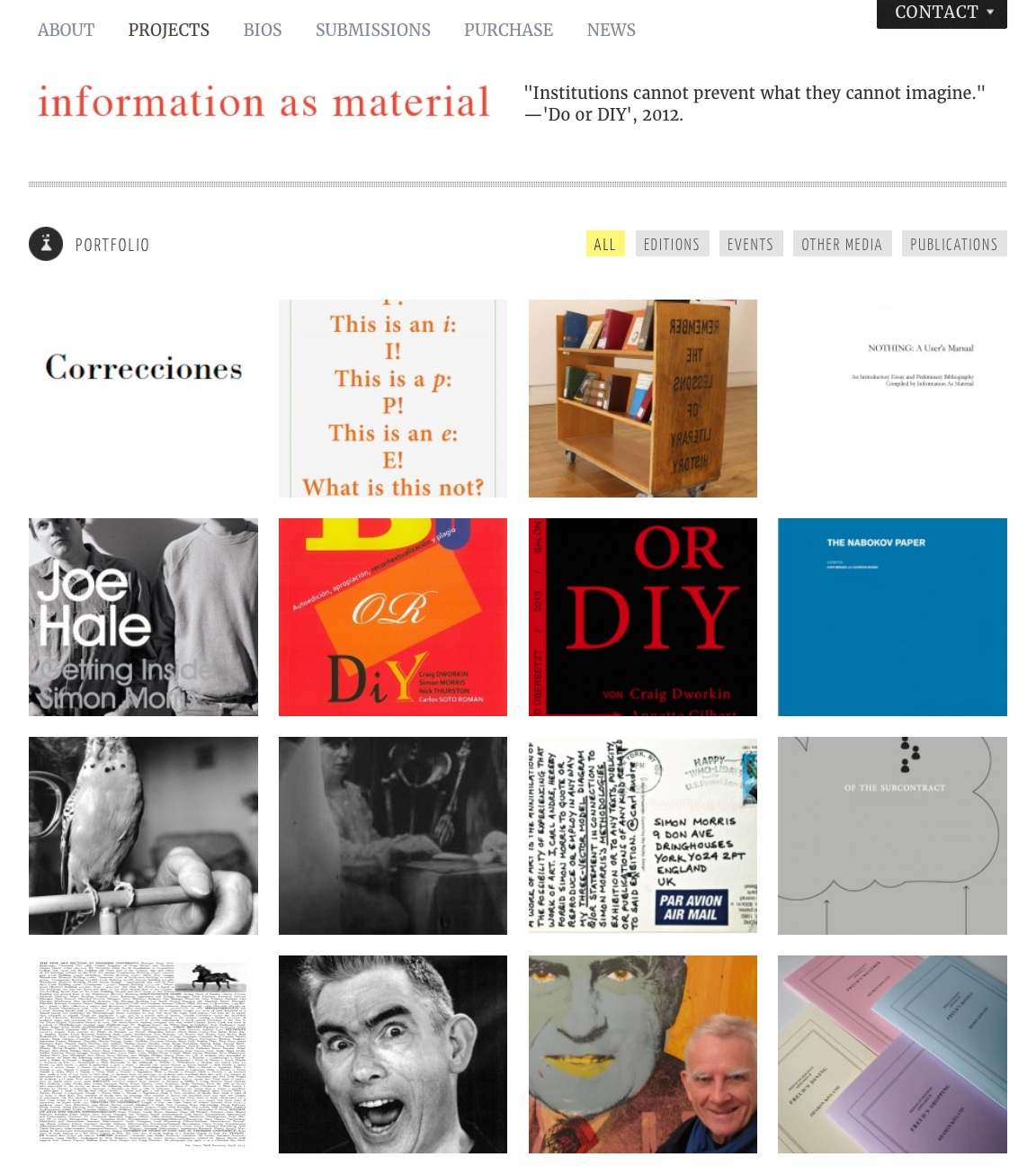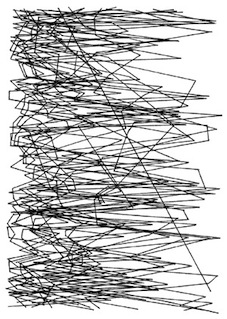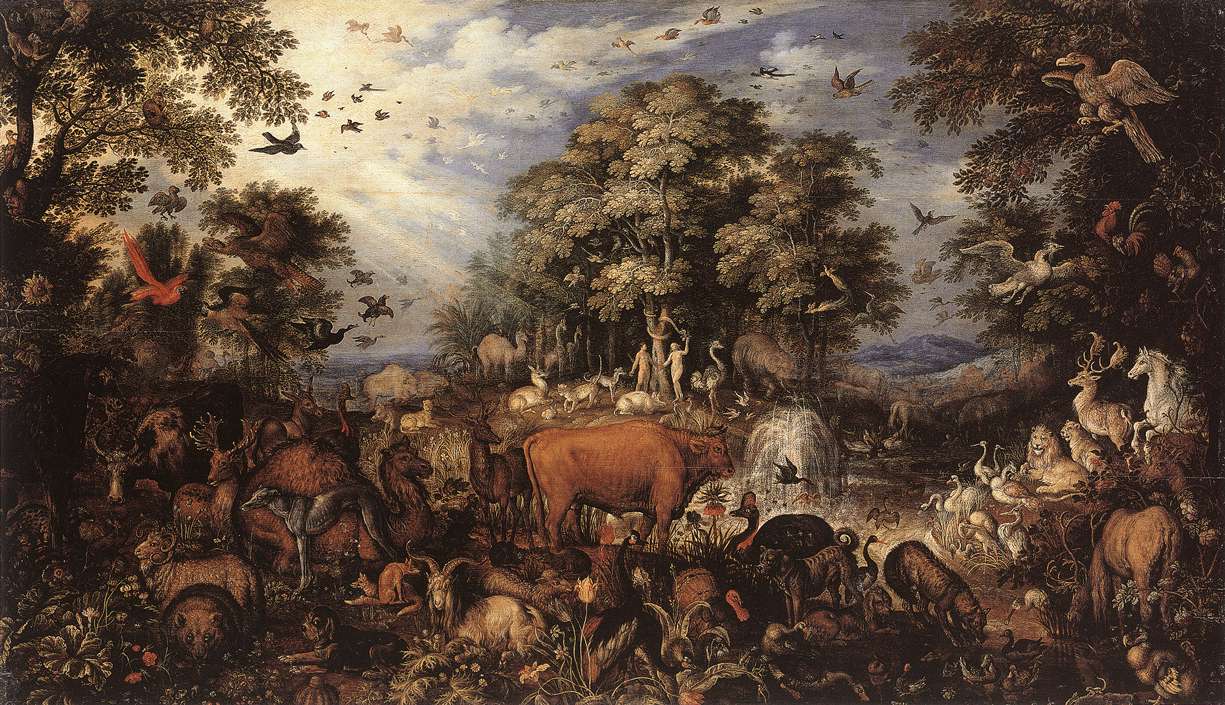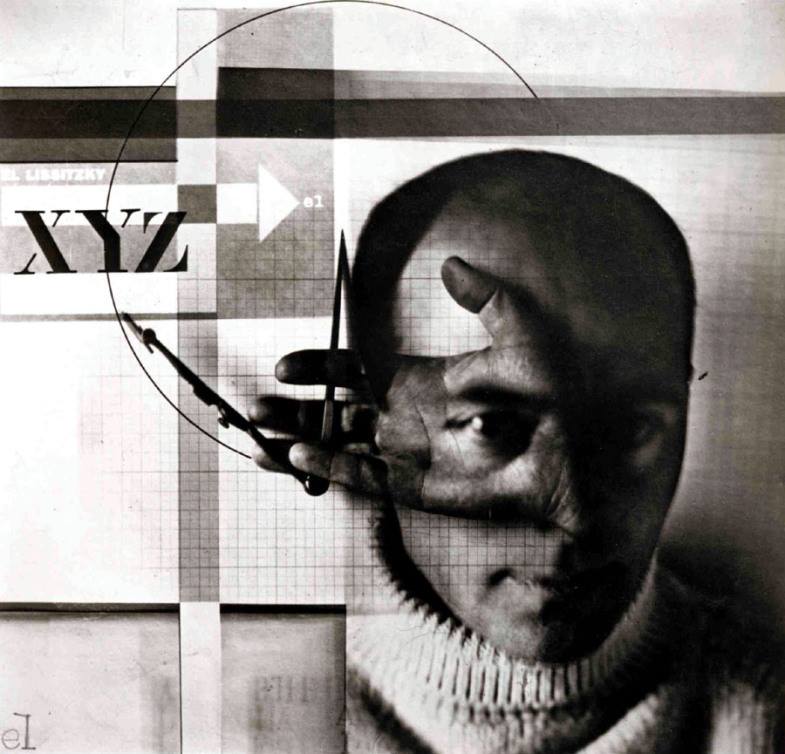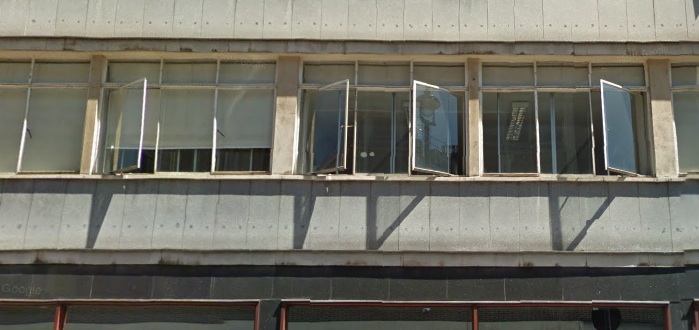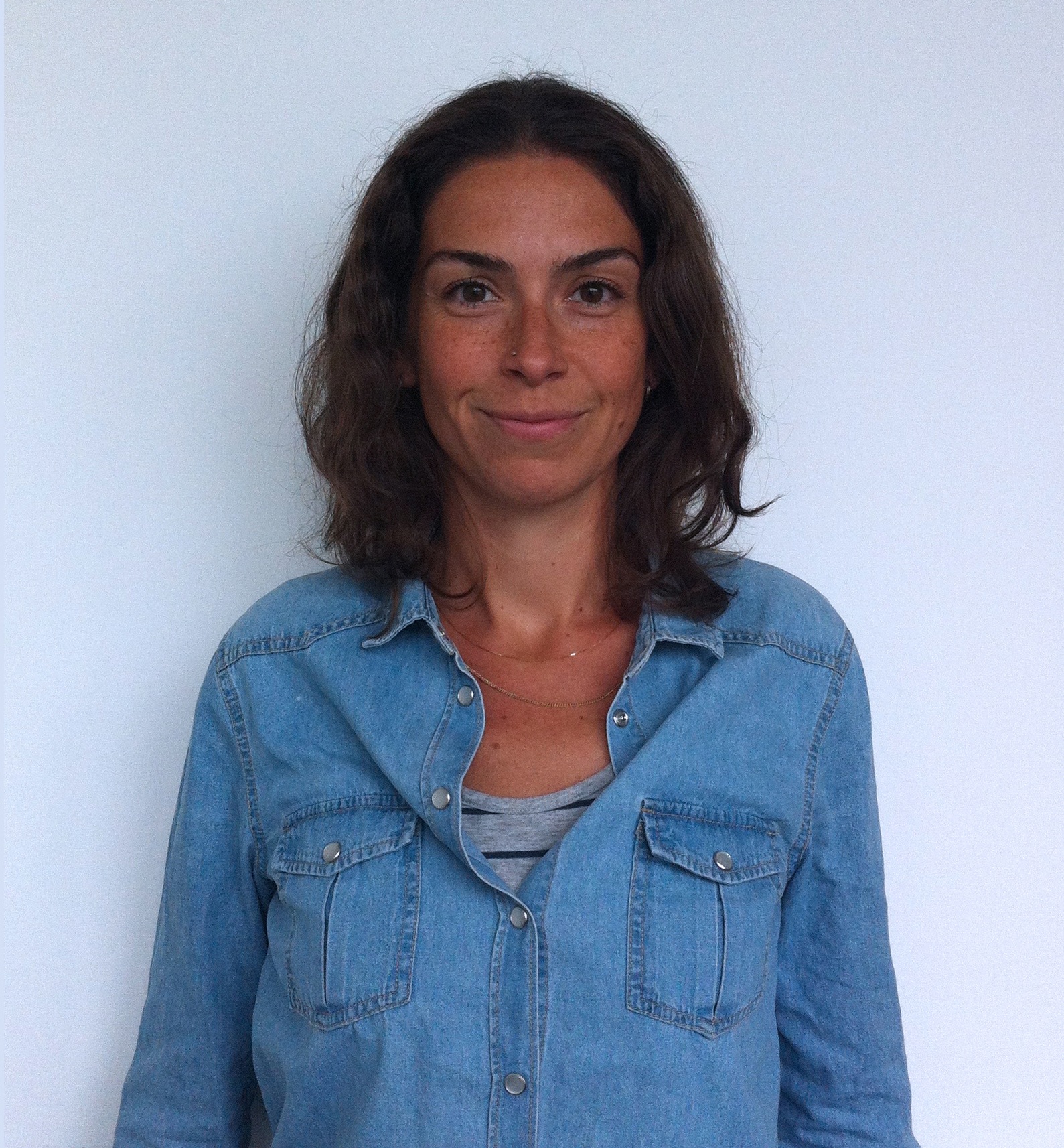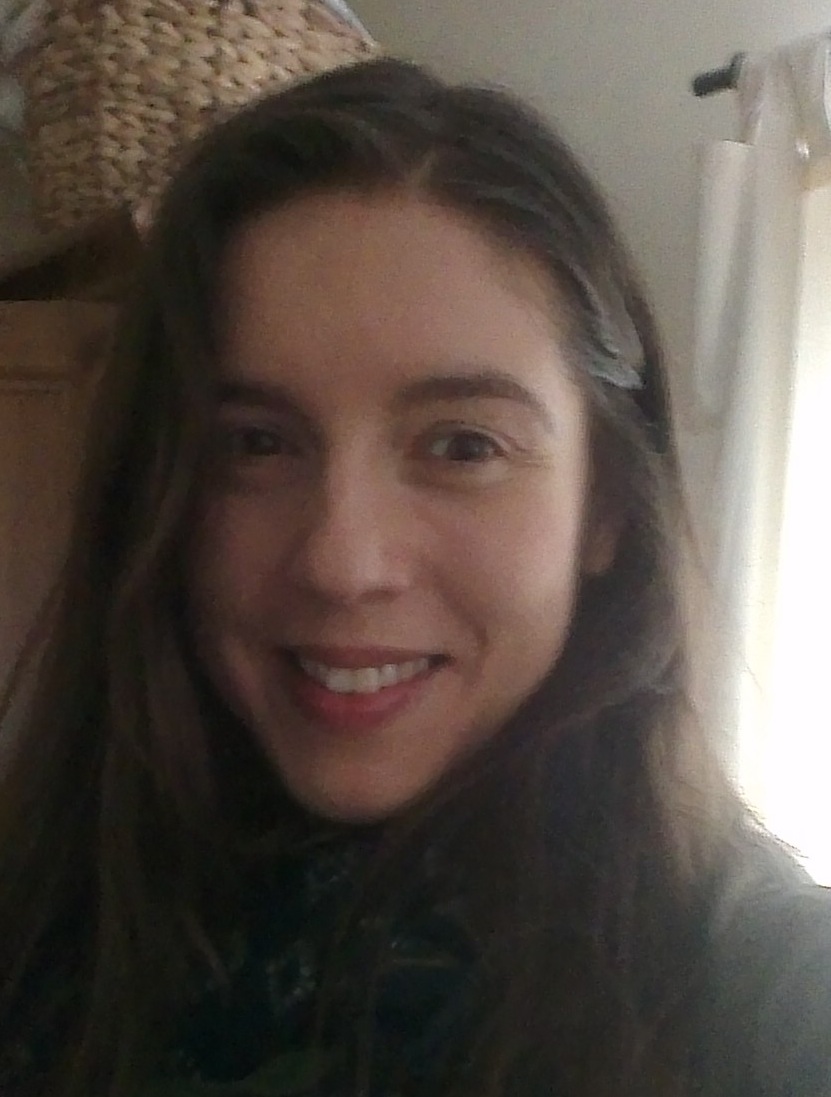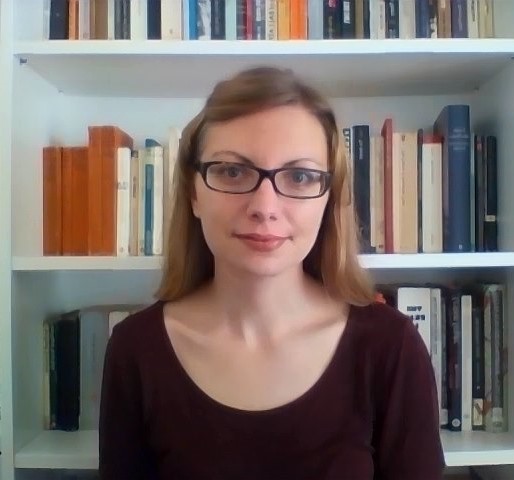Posts by John
Proving Grounds: Biosphere 2 – Then and Now
Friday May 19th, 6pm
University of Westminster, 309 Regent Street, London W1B 2HW, Room UG04
Free admission, but please book here as space is limited.
Kathelin Gray, Biosphere 2 co-founder, in conversation with Dr Rob La Frenais, independent curator
Biosphere 2 was a massive project in the Arizona desert which, in 1991-94, completely enclosed 2 teams of humans, animals and plant life in a closed, sealed environment, creating laboratory conditions to study interactions in a biospheric system, to better understand global ecology, and as a spinoff, towards bio-regenerative conditions in space travel. When Biosphere 2 closed its doors in September 1991 for a two-year experiment in closed systems living and experimental ecology, it was, as it remains, years ahead of its time. The antagonisms which led to the termination of the Biosphere 2 experiment, in 1994, seem all the more absurd in retrospect, particularly in respect of the then involvement of Steve Bannon, now in the Trump administration.
Kathelin Gray who was involved throughout the experiments, says: “ It is ironic that with the reopening of the ‘space race’ to Mars, this work is now being re-examined and in some cases re-invented. The passage of time shows just how important this work was. We need to revisit ways in which we can demonstrate our impact on the ecology and the complex inter-relationships which make human existence on earth possible yet so fragile to our own impacts. Physiologically, culturally and chemically we are all earthlings. Our fate is indissolubly linked with the health of our fellow earthlings: microbes, soils, plants, animals, a concept that was once considered alternative thinking”.
There is still considerable debate about the continuing resonances of the largest project of this type that has ever taken place in the world. Much scientific knowledge was gained from Biosphere 2, despite controversy at the time. What was equally important was that it was also an art-science project, with the Institute of Ecotechnics as scientific coordinator. ‘Theatre of All Possibilities’ and ‘Theatre for the Reconstitution of Reality’ partnered in the experiment, bringing in an ongoing radical cultural experiment taking place inside Biosphere 2, “redefining performative architecture and the role of historical innovation on the world stage” (Gray). This collective, collaborative initiative has established multidisciplinary projects still ongoing worldwide, based in different ecosystems, with the Institute of Ecotechnics.
Rob La Frenais, curator of The Arts Catalyst for 17 years, founder editor of Performance Magazine and now an independent curator, himself visited and interviewed the Biospherians through the glass in the 90’s and will engage Kathelin Gray in a lively and provocative conversation about the legacy of Biosphere 2.
This event marks the launch of Proving Grounds, a new series of workshops and events organised by IMCC and the Centre for Research and Education in Arts and Media (CREAM) at the University of Westminster. The aim of the series is to critically engage with issues of inter- and trans-disciplinarity in relation to speculative, hypothetical or experimental research at the intersections of the arts, humanities and sciences. More information about Proving Grounds will be available at the event.
DIY: Start Your Own Journal, Press, or University
Thursday 26 January 2017, 4-6pm
University of Westminster, The Boardroom, 309 Regent Street
DIY: Start Your Own Journal, Press, or University
Workshop led by Professor Craig Saper (University of Maryland Baltimore County)
Looking at a series of experiments in publishing scholarship, this workshop asks participants to propose venues and modes of presentation appropriate to the scholarly questions they seek to ask.
Based on Craig Saper’s research on Intimate Bureaucracies and on his co-founding Electric Press and Textshop Experiments, founding Roving Eye Press, and starting experimental venues for emerging forms of knowledge, like the online reading machine that simulates a modernist project from 1929, as well as participating in others’ experiments in publishing including Punctum Books and the media-making journal HyperRhiz, this workshop asks participants to propose venues and modes of presentation appropriate to the scholarly questions they seek to ask and invites us to consider publishing as scholarship and not merely a conduit for research.
Admission is free, but please register here
Experiments and Incidents – Julie Martin and Barbara Steveni in Conversation
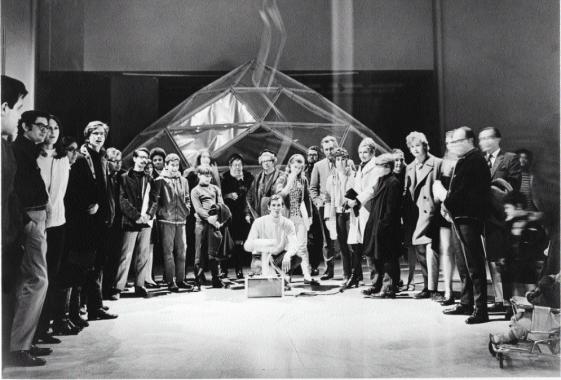
Thursday 27 October 2016, 6.30pm – 8.30pm
Arts Catalyst Center, 74-76 Cromer Street, London, WC1H 8DR
£3 – book here
Experiments and Incidents – Julie Martin and Barbara Steveni in Conversation with Neal White
A reunion between two pioneers in experimental and incidental art practices
IMCC and CREAM at the University of Westminster and Arts Catalyst are delighted to host a reunion between two pioneers in experimental and incidental art practices, Julie Martin (Director of Experiments in Art and Technology) and Barbara Steveni (Artist Placement Group / O+I), chaired by Professor Neal White (University of Westminster).
Pushing at the limits of radical ideas and art practice since 1966, these two women have helped change the landscape of where and how art has been made. This is a unique opportunity to hear both in dialogue, reflecting on not only the past, but the future for art which has an experimental and incidental focus.
This collaboration between the University of Westminster and Arts Catalyst has been developed as part of Arts Catalyst’s season of events that mark the 50th anniversary of E.A.T. and the project the led to their founding 9 Evenings: Theatre and Engineering, titled 9 Evenings: Theatre and Engeneering Revisited 1966/2016.
In addition to this talk, the programme also includes an exhibition reflecting on the work of Experiments in Art and Technology at Arts Catalyst Centre for Art Science & Technology, a talks programme developed in collaboration with Afterall and Side Effects, a major new performance commission by Robert Whitman (co-Founder of E.A.T.).
This 9 Evenings: Theatre and Engeneering Revisited 1966/2016 programme is supported by Arts Council England, Cockayne – Grants for the Arts, The London Community Foundation, PACE, Afterall, Central Saint Martins, UAL, King’s Cross and Goldsmiths, University of London, University of Westminster, London: The Centre for Research and Education in Arts and Media (CREAM) with the Institute for Modern and Contemporary Culture (IMCC) and The Performance Studio.
Caroline Bergvall in Conversation with Marina Warner, September 14th 2016
Zodiac, drawing and wall mural (2015).
Wednesday September 14th, 2016, 7-9pm.
Carroll/Fletcher Gallery, 56-57 Eastcastle Street, London, W1W 8EQ.
£5 Tickets available here.
Dawn Poetics: Caroline Bergvall in Conversation with Marina Warner
Artist, writer and performer, Caroline Bergvall, will perform and present a few video documents from earlier works of which Ghost Cargo (2011), Drift (2014) before introducing her performance Ragadawn (2016). Ragadawn, Caroline’s much anticipated new work is a sunrise performance, which explores the crossing of boundaries and altered states of being through vocal composition, rhythmical speech patterns and recorded languages. Following the presentation and screenings, Caroline will join Professor Marina Warner in conversation to talk about dawn poetics, metamorphosis, liminality, gendering, and darkness and light.
Ragadawn (2016) will premiere in the UK as a one-off performance at the Estuary Festival, Sunday 18th September, 2016, 6:38am. The work is co-produced by Metal, Southend-on-Sea, and Festival de la Batie, Geneva. Ragadawn will embark on an international tour in 2017. Ragadawn is supported by Ville de Genève, Etat de Genève, Fondation Wilsdorf, Fondation Göhner and Royal Norwegian Embassy, London.
This event is part of the series Experimental Writing @ Carroll Fletcher, hosted by the Institute for Modern and Contemporary Culture in collaboration with Carroll Fletcher Gallery. For more information about the event, please contact Georgina Colby at g.colby@westminster.ac.uk
CAROLINE BERGVALL is an artist, writer and performer who works across artforms, media and languages. The recipient of many awards and commissions, her work frequently develops through exploring material traces, literary documents and linguistic detail, language and literary history, sites and histories, hidden or forgotten knowledges. Her sparse textual, spatial and audio works often expose hidden or difficult historical/political events. She is especially noted for her researched multigenre textual work and her strong verbal and vocal performances. Projects alternate between books, printed matter, audio pieces, collaborative performances, site-specific installations. Caroline is based in London and Geneva.
Most recent project: DRIFT (2013-2015): Texts, drawings and maps published as Drift by Nightboat Books (NY, 2014). A collaborative performance involving voice, percussion, datawork toured the UK and Scandinavia (2014) and premieres in Geneva Switzerland (2016). Solo show of graphic works and audio compositions at Callicoon Fine Art gallery (NY, 2015) and CAC (Geneva, 2016). New audio commission TOGETHER (2014), voicework in 3 parts, Swiss radio RTS2 & MAMCO Museum of Contemporary Art (Geneva). Premieres as a performance at Printemps de Septembre, Toulouse, Oct’16.
Other available publications: Meddle English: New and Selected Texts (Nightboat Books, 2011), Middling English (John Hansard Publications, 2010), DVD of installations, Ghost Pieces: five language-based installations (John Hansard Publications, 2011).
Various selected solo and group shows: Whitney Biennial (NY), Tate Modern (London), Louisiania Literature Festival (Copenhagen), Khoj Art Centre (New Delhi), MCA (Denver), The Power Plant Gallery (Toronto), Norrlandsoperan (Sweden), Actoral (Marseille), Poetry International (Southbank Centre), Fundacio Tapiès (Barcelona), Hammer Museum (LA), KUMU (Tallinn), MOMA (NY), Samtidsmuseet (Oslo), Villa Bernasconi (Geneva), Shorelines Literature of the Sea (Southend).
Caroline was Judith E, Wilson Fellow, University of Cambridge (2013-2014), Writer-in-Residence, Whitechapel Gallery, London (2014), Visiting Professor, School of Art and Design, Geneva (2014-2015). Currently a Collaborative Arts Mellon Fellow, Logan Center, University of Chicago (2016).
MARINA WARNER is Professor of English and Creative Writing at Birkbeck College, University of London and a Professorial Research Fellow, SOAS, 2014-2017.
Marina Warner’s mother was Italian and her father an English bookseller; she was brought up in Egypt, Belgium, and Cambridge, England. She has been a writer since she was young, specialising in mythology and fairy-tales, with an emphasis on the part women play in them. Her award-winning books include Alone of All Her Sex: The Myth and the Cult of the Virgin Mary (1976), Joan of Arc: The Image of Female Heroism (l982), From the Beast to the Blonde: On Fairy Tales and Their Tellers (1994) and No Go the Bogeyman (1998). In 1994 she gave the BBC Reith Lectures on the theme of Six Myths of Our Time. Her books include Phantasmagoria: Spirit Visions, Metaphors, and Media (2006), and Stranger Magic: Charmed States and The Arabian Nights (2011). She also writes fiction: The Lost Father (1988), was short listed for the Booker prize, and in 2000, The Leto Bundle (2000) was long-listed. She has curated exhibitions, including The Inner Eye (1996), Metamorphing (2002-3), and Only Make-Believe: Ways of Playing (2005). She chaired the Man Booker International Prize for 2015, and from 2013-15 she was a Two Year Fellow at All Souls College, Oxford.
Once Upon a Time: A Short History of Fairy Tale (OUP, 2014) will be coming out in paperback later this year. A collection of short stories Fly Away Home was published by Salt in autumn 2015. She is currently working on the theme of Sanctuary and culture in times of dislocation and diaspora, and is writing a memoir-cum-novel set in Cairo in the Fifties.
She is a Fellow of the British Academy, and of the Royal Society of Literature. She was made DBE in 2015, and the same year was awarded the Holberg Prize in the Arts and Humanities.
Experimental Writing @ Carroll / Fletcher: Nick Thurston (Information as Material)
Wednesday 29 June 2016, 7pm, Carroll/Fletcher, 56-57 Eastcastle Street, London, W1W 8EQ
Tickets £5, available here
Nick Thurston, an artist and critic, will discuss the work of Information as Material, an independent publishing project, which he co-edits with Simon Morris and Craig Dworkin. Thurston will address questions of materiality of language and independent and experimental publishing, and explore ideas about appropriated and subverted technologies of communication.
The talk will be followed by a conversation between Nick and critic and academic, Stephen Voyce.
This is the fifth event in the Experimental Writing @ Carroll/Fletcher series. Organised by the Institute of Modern and Contemporary Culture at University of Westminster and Carroll/Fletcher, the series showcases contemporary developments in experimental writing and their relationship to the visual arts.
Nick Thurston has exhibited and performed internationally at Denver Museum of Contemporary Art, Toulouse Museum of Contemporary Art, The Laurence Sterne Museum, Whitechapel Gallery, and Bury City Art Gallery, amongst others. He is the author of numerous publications ranging from poetry to prose essays. Since 2006, he has been a co-editor of Information as Material (iam). iam operates as a collective of writer-editors and as an independent imprint that publishes work by artists who use extant material — selecting it and reframing it to generate new meanings — and who, in doing so, disrupt the existing order of things. The imprint’s activities involve writing, publishing, exhibiting, curating, web-based projects, lectures and workshops. iam’s publications and editions are held in private and public collections around the world including Tate (UK), National Library of France (FR), and MoMA (USA). Nick’s own work is collected by the Electronic Poetry Center (University of Buffalo and University of Pennsylvania), which archived his work in 2015. The collection includes his poems, short writings, interviews and book extracts (2006-2014). Nick is a Programme Director of interdisciplinary undergraduate Fine Arts programme at the University of Leeds and a Visiting Fellow in Contemporary Writing at the University of Pennsylvania.
Stephen Voyce is Professor at the English Department at the University of Iowa, where he also holds appointments in the Digital Studio for the Public Arts & Humanities and the Center for the Book. He is the author of Poetic Community: Avant-Garde Activism and Cold War Culture (University of Toronto Press, 2013), the editor of a book of variations: love – zygal – art facts (Coach House Books, 2013), and the Director of the Fluxus Digital Collection. His work also appears in journals such as Jacket2 Magazine, Modernism/modernity, Criticism: A Quarterly Journal for Literature and the Arts, Postmodern Culture, and Open Letter. Voyce’s primary teaching and research interests include twentieth-century poetry, media studies, Marxist criticism and theory, and critical digital studies. Before joining the University of Iowa, he worked in the music industry and as a SSHRC-postdoctoral fellow at the Modern Literature and Culture Research Center in Toronto, Canada.
For more information, please contact either Kaja Marczewska: k.marczewska@westminster.ac.uk
or Asya Bachelis: asya@carrollfletcher.com
Forms of Criticism
Image courtesy of Derek Beaulieu
Thursday 30 June 2016
Parasol Unit, 14 Wharf Road, London N1 7RW
In the Editorial for the first issue of Art-Language (1969) Terry Atkinson raised questions about a possibility of combining creative and critical practice: ‘can this editorial,’ Atkinson wrote, ‘in itself an attempt to evidence some attributes as to what “conceptual art” is, come up for the count as a work of conceptual art?’ Forms of Criticism takes Atkinson’s idea as its starting point to engage with issues of criticism and form and interrogate limits between creative and critical practice.
In poetry, fine art, film making, performance – in the creative sector – we are familiar with and applaud – or tolerate, in the very least – experiments which blur or transgress boundaries of genre, form, or creativity. Similar possibilities of formal experimentation remain significantly underexplored with respect to critical practice, although a growing interest in probing the limits of criticism can currently be observed. Forms of Criticism proposes to think about critical practice as a creative experiment with form in its own right and invites a re-examination of the relationship between research and forms adopted for presenting, communicating, and disseminating it. By considering diverse sites of critical and creative production the project focuses on experimenting with modalities of criticism and ways of addressing formal critical-creative hybridity.
The event brings together artist, curators, writers, critics and scholars addressing questions of hybrid creative-critical forms in theory and practice though talks, performances, screenings, readings and installations. Speakers include: John Beck (IMCC), Kate Briggs (American University in Paris), Eric Cazdyn (University of Toronto), Ducks!, Gary Hall (Coventry University & Open Humanities Press), Peter Jaeger (poet and critic, Roehampton), Kristen Kreider (poet and artist, Royal Holloway), Richard Misek (filmmaker), Simon Morris (Leeds Beckett University), Jo Collinson Scott (musician and musicologist), Marquard Smith (Journal of Visual Culture and Piet Zwart Institute, Rotterdam), and Nick Thurston (artist, University of Pennsylvania and Leeds).
The event is free and open to all but places are limited and booking is essential. For more information about the event and to reserve tickets please go to: http://www.formsofcriticism.net/
For more information, please contact Kaja Marczewska: k.marczewska@westminster.ac.uk
Literary Criticism and the Small Press: A Symposium
Saturday 1 July 2016, 10am-6pm
The Boardroom, University of Westminster, 309 Regent Street, London, WIB 2UW
Literary criticism has historically been practised using three broad models: a close attention to form; a consideration of the way that histories of ideas, identities and social forms are apparent in literary work; a more sociologically oriented consideration of practices of production and reading. From the twentieth century on, while the relations among these, and the prioritising or marginalising of each, shifted and changed, the mutual shaping of literary writing and its means of production has been consistently ignored. In contemporary literary criticism, while much literary critical work combines the first and the second, very little considers all three. Detailed consideration of the way that formal elements are shaped by and interact with the production and dissemination of writing remains almost absent from the discipline. At the same time, the limits of mainstream publishing and the growth of the small press have each been particularly visible since the economic crash of 2008, yet an investigation of the relation between this and the kinds of writing studied and interpreted has not emerged. Literary Criticism and the Small Press: A Symposium aims to draw attention to and investigate this absence through three broad themes. The location of the small press as the site of formal innovation is clear from the end of the nineteenth century, and its role in the dissemination of modernism is well known. How has this relation changed over the last century or so, and what are the interventions or absences in the literary critical work with regard to it? From William Morris to the digital revolution, the relation of the small press to writing has made central the question of materiality. What is the relation between material and linguistic forms? The relation of the small press to the mainstream, the material forms of writing and linguistic innovation are all mediated and determined by the institutions within which they exist — publishing, bookselling, the university, government funding of the arts and universities, and so on. How do these institutions shape what is published, where and for whom?
The symposium will consist of three panels:
Materialities: Nicholas Thoburn; Sophie Seita
Institutions: Claire Squires; Lisa Otty; Nick Thurston; Matvei Yankelevich
Histories: John Wrighton; Matthew Sperling; Stephen Voyce; Richard Price
The event is free, but please book your place here.
The Symposium has been organized by Dr Georgina Colby, Dr Kaja Marczewska and Dr Leigh Wilson as part of the Contemporary Small Press Project, supported by the Institute for Modern and Contemporary Culture, University of Westminster.
For more information please contact: Dr Leigh Wilson: wilsonl@wmin.ac.uk
Conference: The Hypothetical

Saturday 25th-Sunday 26th June 2016
Room UG04, 309 Regent Street, London W1B 2HW
The Hypothetical: Institutions, Fictions, Environments
A hypothesis is literally a placing under, and thus a foundation or basis for an argument. As a foundation, though, a hypothesis is less than concrete; it is a starting point, a premise, a conjecture, a supposition. A hypothesis stands in a provisional relation to the known facts — may, indeed, fly in the face of the facts — and at worst can be described as a mere assumption or guess. A hypothesis, then, is a provocation. It demands investigation, testing, evaluation, perhaps refutation. A hypothesis has expectations.
The purpose of this conference is to interrogate the ramifications of the hypothetical in its philosophical, scientific, technological, historical, literary and artistic forms. How do the fictional, the conjectural, or the notional provide the operational conditions for new knowledge, new social and political forms, and new modes of describing the world? What are the temporalities that govern the hypothetical? How does the hypothetical put pressure on existing forms and practices, within and across the arts and the sciences? Are there limits — organisational, structural, ideological, disciplinary — beyond which the hypothetical collapses into the simply impossible? Or is the impossible an ideological bracketing of the emancipatory potential of the hypothetical? Alternatively, does the hypothetical run the risk of producing hypocriticism, a mode of reflexive and opportunist self-interest that merely reinscribes the position of the hypothesist?
Speakers: Claudia Aradau (King’s College London); Mark Currie (Queen Mary, University of London); Elizabeth Ellsworth & Jamie Kruse (by video link) (The New School, New York City); Mikhail Epstein (Durham University); Greg Garrard (University of British Columbia); John Richard Sageng (University of Oslo); David Wittenberg (University of Iowa).
View the conference programme here
Contact: John Beck j.beck@westminster.ac.uk
The conference is free but it is essential to register via Eventbrite
Experimental Writing @ Carroll / Fletcher: Christian Bök
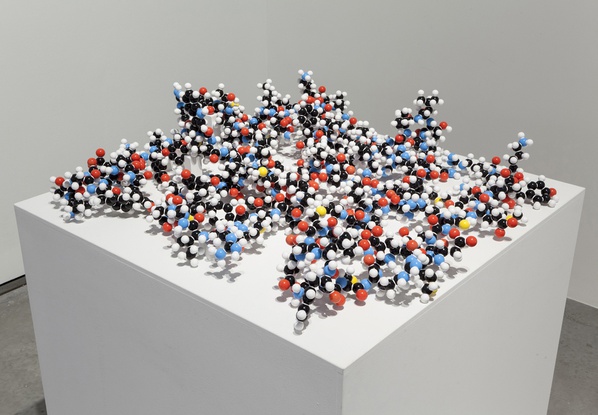
Monday 23 May 2016, 7pm, Carroll / Fletcher, 56-57 Eastcastle Street, London, W1W 8EQ
Tickets £5 available here
Christian Bök, an experimental poet and conceptual artist will discuss the intellectual foundation for his innovative experiment, The Xenotext – a work that required Bök to engineer the genome of an unkillable bacterium so that the DNA of such an organism might become not only a durable archive that stores a poem for eternity, but also an operant machine that writes a poem in response. The presentation will be accompanied by literary readings of poetry, produced in response to his research.
The talk will be followed by a conversation between Christian and the IMCC’s John Beck.
This is the fourth event in the Experimental Writing @ Carroll / Fletcher series. Organised by the Institute of Modern and Contemporary Culture at University of Westminster and Carroll / Fletcher, the series showcases contemporary developments in experimental writing and their relationship to the visual arts.
Christian Bök is a Canadian experimental poet and artist. He is the author of Crystallography (Coach House Press, 1994), a pataphysical encyclopedia nominated for the Gerald Lampert Memorial Award, and of Eunoia (Coach House Books, 2001), a work of experimental literature, which won the Griffin Prize for Poetic Excellence. Bök has created artificial languages for two television shows: Gene Roddenberry’s Earth: Final Conflict and Peter Benchley’s Amazon. Bök is also known for his performances of sound poetry (particularly the Ursonate by Kurt Schwitters). His conceptual artworks, which include books built out of Rubik’s cubes and Lego bricks, have appeared at the Marianne Boesky Gallery in New York City as part of the exhibit Poetry Plastique. Bök is currently a Professor of English at the University of Calgary.
For more information, please contact either:
Kaja Marczewska: k.marczewska@westminster.ac.uk
or Asya Bachelis: asya@carrollfletcher.com
Masterclass with Christian Bök
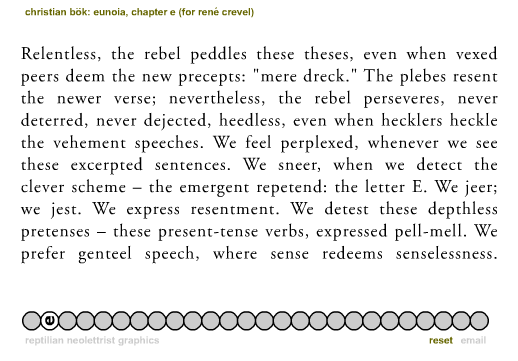
Monday 23 May, 11:00 am-1.30 pm, 309 Regent Street, London W1B 2UW.
We are delighted to announce a Masterclass with Canadian writer Christian Bök. The Masterclass is part of our Experimental Writing series and coincides with an event @Carroll/Fletcher later this month (further details will be available in due course).
This masterclass will introduce some of the techniques of Conceptualism, a school of writing that often uses technical resources on the Internet to explore the aesthetics of “the uncreative”: for example, the readymade writing of the unoriginal text; the mannerist writing of the constrained text; the illegible writing of the unreadable text; and the aleatoric writing of the authorless text. The class explores these four ways of writing so that participants might torque them to their own, otherwise “creative,” purposes.
Participation in the Masterclass is free but places are limited and registration is essential. While priority will be given to postgraduate students (both taught and research) and early career researchers, all applications are welcome!
For further information, please contact Kaja at k.marczewska@westminster.ac.uk
Registration: http://goo.gl/forms/9an5RDI9Y2
Welcome to Carmen Caruso, Junior Visiting Research Fellow
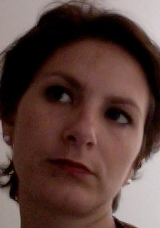
The IMCC is delighted to welcome Carmen Caruso as our visiting research fellow during the Spring and Summer of 2016. Carmen has a Ph.D. in Migration Studies (University of Catania), an MA in Gender Studies (SOAS), and a BA in Political Science (University of Bologna). She is a teaching assistant in Applied Ethics in the Philosophy Department at the University of Calabria (UNICAL). Carmen was a Postdoctoral Research Fellow at the Centre for Gender Studies at the School of Oriental and African Studies (SOAS) where she developed a project on the Lebanese diaspora in the UK from a gender perspesctive. To date, her research has focused on three interrelated areas of inquiry: human mobility (with an emphasis on diasporas from the Arab world), identity and citizenship, aesthetics and the material and performative dimension of culture. Recently she has edited a volume on the city of Jerusalem.
Sexual Violence Against Women: Voice and Representation
Friday 17th June 2016
St Pancras Room, King’s Place, 09:30-17:00
This one-day symposium organised by Dr Georgina Colby and Hannah Camplin aims to bring keynote academics and practitioners in the fields of law, politics, and charities into dialogue with writers, artists, and filmmakers who take up the issues surrounding sexual violence against women in their works. The symposium will open with a keynote address by Professor Jacqueline Rose (FBA, Birkbeck Institute for the Humanities, University of London), titled ‘Feminism and the Abomination of Violence.’ Professor Rose’s keynote address will be followed by a lunchtime keynote paper by Keir Starmer MP, Holborn and St Pancras. There will be two afternoon panels on ‘Sexual Violence, Belief, and Credibility’, and ‘Voice and Representation: Empowering Voice and Enacting Change Through the Arts and Humanities’.
Tickets are priced at £6.00, excluding booking fee (£1.52). All proceeds from tickets sales will go to the Women’s Project at Asylum Aid. Tickets include coffee and refreshments throughout the day.
Tickets are available through Eventbrite.
Contact Georgina Colby for further information: g.colby@westminster.ac.uk.
Mark Amerika, Mobile Phone Film, Immobilité
Wednesday, 11 May 2016, 6:00 pm
Regent St Cinema, 309 Regent St, London W1B 2UW
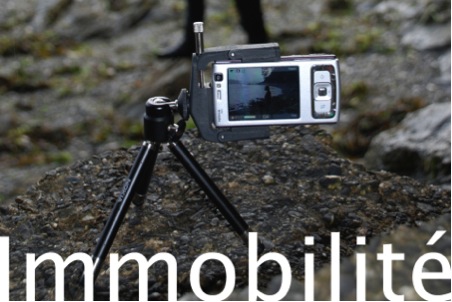
We are delighted to announce the UK premiere of Mark Amerika’s work of early mobile phone video art, Immobilité.
Released in 2009, Mark Amerika’s Immobilité appropriates the stylistic tendencies of the “feature-length foreign film.” The artwork introduces the creative use of subtitles that double as a literary text depicting a future world where the dream of living in utopia can only be sustained by a nomadic tribe of artists and intellectuals living on the edge of apocalypse.
According to Amerika, “Immobilité mashes up the language of auteur-driven ‘foreign films’ with a more amateur video vernacular we now associate with social media platforms like YouTube and Vine.” By experimenting with a low-tech glitch aesthetic associated with pre-HD mobile phone video recording technology as well as more sophisticated forms of motion picture narrative found in European art-house movies, Amerika makes an attempt at interrogating the question: “What is the future of cinema?”
Shot entirely on a Nokia N95 mobile phone in 2007 (before the release of the iPhone), Immobilité was filmed on location in the Cornwall region of England and received support from the University of Falmouth iRES research group, Tate Media, and the University of Colorado Innovative Seed Grant. Solo exhibitions of Immobilité have taken place at the Denver Art Museum, the National Museum of Contemporary Art in Athens, and the Chelsea Art Museum.
For more information on Immobilité, visit immobilite.com
For further information about the event, please contact Kaja Marczewska: k.marczewska@westminster.ac.uk
The film will be introduced by Mark Amerika, in conversation with Chris Meigh-Andrews.
The event is free and open to all. Booking is essential and tickets are available here.
Experimental Writing @ Carroll / Fletcher: Nick Montfort with Manfred Mohr
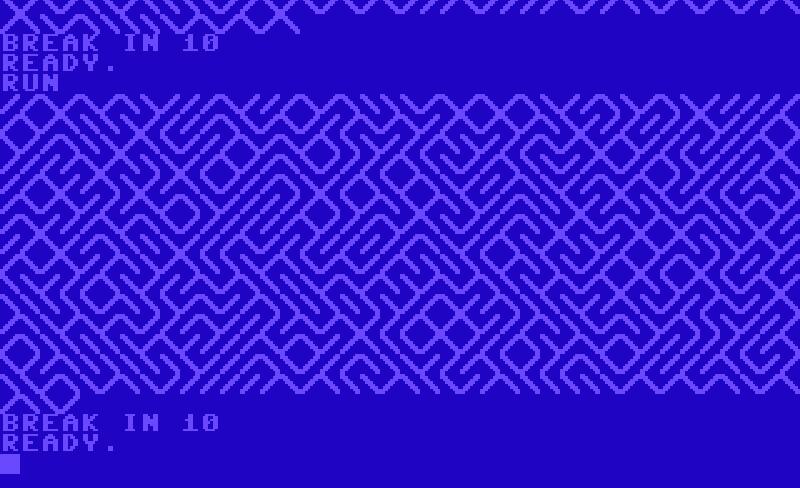
Friday, 12 February 2016, 7pm
Carroll/Fletcher, 56-57 Eastcastle Street, London, W1W 8EQ
Experimental Writing @ Carroll / Fletcher: Nick Montfort with Manfred Mohr
£5; tickets available here
Nick Montfort, a poet and artist working with computer-generated texts, will read from a selection of his works, including #! (Counterpath Press, 2015) and the forthcoming 2×6 (Les Figues, 2016). In addition, he will present some of his recent Commodore 64 visual poems, and discuss code-generated poetry, as well as broader questions of computation, language and creativity.
The reading will be followed by a conversation between Nick, digital art pioneer Manfred Mohr, and writer and academic Matthew Fuller.
This is the first event in the Experimental Writing @ Carroll/Fletcher series. Organised by the Institute for Modern and Contemporary Culture at University of Westminster and Carroll/Fletcher, the series showcases contemporary developments in experimental writing and their relationship to the visual arts.
Nick Montfort develops computational art and poetry, often collaboratively, and works as an Associate Professor of Digital Media at the Massachusetts Institute of Technology (MIT), where he also runs The Trope Tank, a DIY, boundary-transgressing MIT research lab hosting both academic and creative projects. Montfort holds a Ph.D. in Computer and Information Science from the University of Pennsylvania, a Masters in Creative Writing (poetry) from Boston University and a Masters in Media Arts and Sciences from MIT. He has been one of the key figures behind the development of platform studies, critical code studies, and electronic literature. His works have been translated into half a dozen languages and served as a basis for numerous remixes.
#! (Counterpath, 2014; the title is pronounced “shebang”) is Montfort’s latest book, and contains programs and poems. Forthcoming in 2016 is Montfort’s Exploratory Programming for the Arts and Humanities (MIT Press), which continues his long-term project to teach programming as a method of culturally engaged inquiry and making. Also coming in 2016 is 2×6 (Les Figues), a book of computer-generated poems created in collaboration with six others, in English and five other languages.
Manfred Mohr lives and works in NYC. He is a pioneer of digital art and one of the very first artists to produce drawings, paintings and sculptures using a computer. Mohr originally trained as a painter, and has made rigorously minimal, geometric paintings and drawings since the late 1950s, informed by Abstract Expressionism. He has been experimenting with algorithms and formal constraints since the 1960s, developing what he called a ‘programmed aesthetic’ inspired by philosopher Max Bense’s thinking that a ‘clear and logical’ form of art making was possible – and indeed desirable. These first experiments set Mohr on a path that he has followed to this day, despite the art world’s resistance to the idea of the computer as a legitimate art medium.
Selected solo exhibitions include Artificiata II, bitforms, New York (2015); The Algorithm of Manfred Mohr. 1963−now, ZKM – Media Museum, Karlsruhe (2013); one and zero, Carroll / Fletcher, London (2012); Kunsthalle Bremen (2007) and the Musée d’Art Moderne de la ville de Paris (1971). He has exhibited in group shows at prestigious institutions including the National Museum of Modern Art, Tokyo (1984); Museum of Modern Art, New York (1980); and Centre Pompidou, Paris (1978, 1992). His work is held in major international institutions and private collections including the Victoria and Albert Museum, London; Centre Pompidou, Paris; Museum Ludwig, Cologne; Musée d’Art Contemporain, Montreal; and Borusan Art Collection, Istanbul.
Matthew Fuller’s books include ‘Media Ecologies, materialist energies in art and technoculture’, (MIT) ‘Behind the Blip, essays on the culture of software’ and ‘Elephant & Castle’. (both Autonomedia) With Usman Haque, he is co-author of ‘Urban Versioning System v1.0’ (ALNY) and with Andrew Goffey, of ‘Evil Media’. (MIT) Editor of ‘Software Studies, a lexicon’, (MIT) and co-editor of of the Journal Computational Culture, he is involved in a number of projects in art, media and software and is Professor at the Centre for Cultural Studies, Goldsmiths, University of London.
For more information, please contact either Kaja Marczewska at k.marczewska@westminster.ac.uk or Asya Bachelis at asya@carrollfletcher.com
Georgina Colby on Kathy Acker
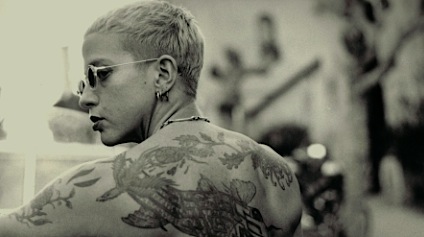
Wednesday 3 February, 5pm
Room 105, University of Westminster, 32-38 Wells Street, London W1T 3UW
‘Writing-Through’: Kathy Acker’s Don Quixote: Which Was a Dream
Georgina Colby (Westminster), with a response by Leigh Wilson
This paper reads Kathy Acker’s Don Quixote: Which Was a Dream as a form of non-procedural ‘writing-through’, a term that has its roots in the procedural practices of John Cage and Jackson Mac Low. In Don Quixote Acker’s experimental practice displaces centralized narrative, to offer a new feminist temporality. Reading the work with attention to Acker’s practice of abstraction, experimentation with translation, paragrammatic play, and the protosemantic, a method of writing-through emerges whereby voice is imbricated with the negation of language.
All welcome and entrance free. Non-Westminster guests can sign in at reception.
‘Take this Instant’: Sacrifice, Testimony and the Gift of My Death
Wednesday 9 December, 5pm
Room 105, University of Westminster, 32-38 Wells Street, London W1T 3UW
‘Take this Instant’: Sacrifice, Testimony and the Gift of My Death
Shela Sheikh (Goldsmiths), with a response by Elinor Taylor
In Aporias: Dying—Awaiting (One Another at) the “Limits of Truth”, Jacques Derrida poses the question: ‘My death—is it possible?’ How is this question to be understood, and who can pose it? And if my death is properly mine, how am I to account for—in fact, to give an account of—this? This paper responds to these questions by turning to accounts of both being-towards and surviving death in Maurice Blanchot’s fictional/autobiographical récit, ‘The Instant of my Death’, but also the phenomenon of pre-recorded video-testimonies in which the subject announces his/her own death, and does so from a temporality that is at once past, present and futural. Through a reading of technically-mediated performances of accounting for and bearing witness to one’s ‘own’ death—and with this a consideration of the logic of sacrifice, radical passivity, the gift of death, and the contemporary conjunction between religion, geopolitical conflict and media—Sheikh proposes that such accounts bears witness to what Derrida identifies as the anachronistic ‘history of death’ in the Christian West, before supplementing this focus on the West with further consideration of what Nelson Maldonado-Torres names ‘the coloniality of being’.
All welcome and entrance free. Non-Westminster guests can sign in at reception.
Followed by drinks in the Green Man…
Culture, Memory & Extinction
11 December 2015, 9.00am-5.00pm
Natural History Museum, London
Recent months have seen an explosion of public, media and academic interest in the idea, threat and reality of extinction. This acknowledgement has contributed to debates over climate change and other, related, ways that humanity has altered environments and ecosystems in this epoch we have begun to call the Anthropocene. This one-day conference asks what role can culture play in widening the understanding, representation and, indeed, remembrance of this unfolding and catastrophic species loss. With this in mind, the event aims to foster dialogue between academics, journalists, museum curators, charities, writers, environmental groups, and the media to explore how societies engage with the complexities of the processes of extinction and remember the extinct. More specifically, the event examines how increased dialogue between these communities and constituencies contributes to the public re-evaluation and remembrance of life on our planet.
Speakers:
Dan Barnard & Rachel Briscoe. Lead Artists, fanSHEN Environmental Theatre Collective.
Fae Brauer. Professor of Art and Visual Culture, University of East London.
Sbastian Brooke. Director, MEMO (Mass Extinction Monitoring Observatory).
Melanie Challenger. Author, On Extinction.
Cathy Dean. Director, Save the Rhino.
Sebastian Groes. English and Creative Writing, Roehampton University.
Steve Parker. Author, Extinction: Not the End of the World?.
Jules Pretty. Professor of Environment and Society, University of Essex.
Bernd Scherer. Director, Haus der Kulturen der Welt, Berlin.
Matt Williams. Associate Director, A Focus on Nature.
Matthew Wills. Biodiversity Lab, University of Bath.
Free tickets: register at https://www.eventbrite.co.uk/e/culture-memory-and-extinction-tickets-19379987063
Website: https://naturalhistoryofmemory.wordpress.com/london-2015/
Email: memoryandextinction@gmail.com
Organised by The Natural History of Memory: Dr Lucy Bond (Westminster), Dr Rick Crownshaw (Goldsmiths), Dr Jessica Rapson (King’s College London); Research assistant: Ifor Duncan (Goldsmiths).
Andrew Benjamin: A Colloquium on Art’s Philosophical Work
Wednesday 4th November 2015, 5pm
Westminster Forum, 32-38 Wells Street, London W1T 3UW.
Professor Andrew Benjamin (Kingston) will be with us at the Institute to discuss his new book Art’s Philosophical Work. The book offers an argument for how art ‘works’, using examples from Nicholas Poussin, Albrecht Dürer, Georg Baselitz, El Lissitsky and Karel Appel. Andrew’s talk will be followed by responses from Kaja Marczewska on ‘iteration’, David Cunningham on ‘relationality’ and Matthew Charles on ‘colour’.
The event is free and open to the public (guests will need to sign-in at reception).
Followed by drinks in The Green Man, Riding House Street.
Andrew Benjamin is a Distinguished Professor of Philosophy and the Humanities at Kingston University, UK, and Professor of Philosophy and Jewish Thought at Monash University, Australia. His many publications include Working with Walter Benjamin (2012), Of Jews and Animals (2010), Place, Commonality and Judgment (2010) and Style and Time: Essays on the Politics of Appearance (2006).
English Literature and Cultural Studies seminars
We have a great series of fortnightly seminars lined up for the new semester. Venue is Wells Street Room 105 at 5pm. All welcome.
14th October
Dr Victoria Browne (Oxford Brookes), with Sanna Melin.
‘Generational Politics in Feminist Theory’
4th November
Prof Andrew Benjamin (Kingston), with Kaja Marczewska, Matthew Charles and David Cunningham.
‘A Colloquium on Art’s Philosophical Work’
11th November
Dr Katherine Graham (Westminster), with Simon Avery.
‘“[N]or bear I in this breast / So much cold spirit to be called a woman”: the queerness of female revenge’
25th November
Dr Andreas Kramer (Goldsmiths), with John Beck.
‘Inventing Maps: Towards a Geography of the Avant-Garde’
9th December
Dr Shela Sheik (Goldsmiths), with tba.
‘Take This Instant: Video-testimony, Performativity and the Fabrication of Truth’
The Institute welcomes three new members
The Institute is delighted to welcome three new Postdoctoral Teaching and Research Fellows who are joining the Department of English, Linguistics and Cultural Studies this academic year.
Sara Dominici works on photography and its cultural history within the fields of visual culture and cultural studies. Her ongoing research is in the visual culture of The Regent Street Polytechnic and its spin-off organisation, The Polytechnic Touring Association. Specifically, she is exploring the changing relationship between photography and travel and tourism in the nineteenth and twentieth centuries, investigating how the development of popular photography influenced the shifting relationship between ‘high’, or established, and ‘low’, or emerging, forms of culture. Sara completed a PhD at the University of Westminster (2014), and previously studied at La Sapienza University, Rome (Laurea quinquennale in Scienze della Comunicazione, 2004), at the London College of Communication (FdA in Photojournalism, 2006), and holds an MA in Visual Culture from the University of Westminster (2010). She has also worked as a picture editor in both commercial and non-profit organisations.
Kaja Marczewska’s research interests span avant-garde and experimental literature and art, both contemporary and historical, conceptual art and writing, small press publishing, material texts, contemporary cultural, literary and art theory, digital aesthetics, as well as intersections of humanities and law. She holds a PhD in English from Durham University and an MA in Comparative Literature from King’s College, London. Kaja’s PhD, titled The Iterative TIMCCurn, investigated the implications of the increasingly prominent propensity to copy as a creative practice in contemporary culture. It was an attempt at defining a cultural condition that triggers novel attitudes to creativity and reconceptualising copying as a creative category. Her current research builds on ideas explored in the PhD and interrogates diverse aesthetic developments triggered by the turn towards iteration, including among others creative responses to online surveillance culture, experimental forms of writing criticism, the emergence of curating as a dominant contemporary model of cultural production, and digital kitsch.
Elinor Taylor previously taught at the University of Salford, where she completed her PhD, and at Liverpool John Moores University. Her research so far has focused on relationships between British literary culture and the political left. In particular, she is interested interrelationships between Marxism, modernism and realism, the history of Marxism and Communism in Britain, theories of populism, and the novel form. Elinor is currently revising revising her doctoral thesis on fiction associated with the ‘Popular Front’ anti-fascist formation in Britain, as well as writing about Communist historical narrative. She is also interested in archival practices, especially in activist archives, and she plans to develop links with institutions of this kind in London.




